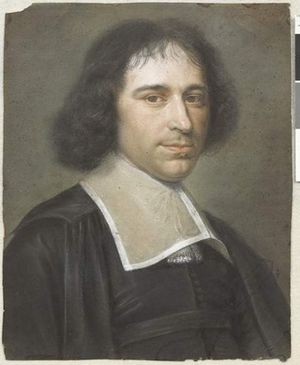Gilles Ménage facts for kids
Quick facts for kids
Gilles Ménage
|
|
|---|---|

Portrait, by Bernard Vaillant, thought to be of Ménage
|
Gilles Ménage (French: [menaʒ]; August 15, 1613 – July 23, 1692) was a very smart French scholar. He was known for his deep knowledge of languages and history. He became a famous writer and teacher, even though his sharp wit sometimes caused him trouble.
Contents
Biography
Early Life and Studies
Gilles Ménage was born in Angers, France. His father, Guillaume Ménage, was a lawyer for the king. Gilles was very good at remembering things and loved to learn. This helped him quickly finish his studies in literature and law. He started working as a lawyer in Angers before he was twenty years old. In 1632, he even argued cases in front of the parlement of Paris. This was a high court in France.
A Change in Career
Gilles Ménage became ill, which made him leave his job as a lawyer. He then decided to join the church. He became a prior of Montdidier. A prior is a leader in a religious community. However, he did not become a priest or take holy orders. For several years, he lived with Cardinal de Retz. Cardinal de Retz was a high-ranking church official. Living with him gave Ménage plenty of time to focus on his studies and writing.
Literary Gatherings and Teaching
Around 1648, Ménage had a disagreement with Cardinal de Retz. He then moved to a house near the famous Notre-Dame de Paris cathedral. Here, he started hosting special meetings on Wednesday evenings. He called these gatherings "Mercuriales." Many important writers and thinkers of the time came to these meetings. Some of them included Jean Chapelain, Paul Pellisson, and Valentin Conrart.
Ménage also taught Marie-Madeleine Pioche de la Vergne, comtesse de la Fayette. She later became a very famous writer. Ménage was very fond of her.
Challenges and Recognition
Ménage was accepted into the Accademia della Crusca in Florence, Italy. This was a respected group that studied the Italian language. However, his sharp and sometimes harsh way of speaking caused problems. His critical comments led to him being kept out of the Académie française. This was the most important French group for language and literature.
Because of his biting humor, Ménage made many enemies. Famous writers like Boileau and Molière even made fun of him in their works. Molière, a famous playwright, showed Ménage as a very strict and overly academic character named Vadius in his play Les Femmes savantes. Ménage pretended not to notice this.
Important Contributions to Scholarship
In 1664, Ménage published an important book in London. It was an edition of the Lives of Eminent Philosophers by Diogenes Laërtius. This book included a new, never-before-seen biography of the famous philosopher Aristotle. People called this biography 'Vita Menagiana' for a long time.
In 1690, he published another important work called Historia Mulierum Philosopharum. This book was a collection of information about 65 women philosophers from ancient times. Ménage wanted to create a history for these forgotten women. He dedicated his work to Anne Lefevre Dacier. He called her "the most learned of women" of her time.
Later Life and Legacy
Gilles Ménage died in Paris in 1692. After he passed away, his friends collected his clever sayings and conversations. They published them in a book called Menagiana. This collection became very popular.
Works (partial list)
- Poemata latina, gallica, graeca, et italica (1656)
- Observationes et emendationes in Diogenem Laertium Paris 1663 (reprint: London, 1664; Amsterdam, 1692)
- Origini della lingua italiana (1669)
- Dictionnaire etymologique (1650 and 1670)
- Observations sur la langue française (1672–1676)
- Histoire de Sablé (1686)
- Anti-Baillet (1690)
- Historia mulierum philosopharum (1690) - French language translation as: "Histoire des femmes philosophes", Gilles Ménage; 2006, Paris; Editions Arléa (Translated into French from Latin by Manuella Vaney with an introduction by Claude Tarrene); 96 pages, ISBN: 2-86959-719-3 - (See: [1]).
English translations
- The History of Women Philosophers translated from the Latin with an introduction by Beatrice H. Zedler, Lanham: University press of America (1984)
See also
 In Spanish: Gilles Ménage para niños
In Spanish: Gilles Ménage para niños
 | Percy Lavon Julian |
 | Katherine Johnson |
 | George Washington Carver |
 | Annie Easley |

